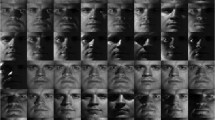Abstract
In this paper, we propose a method of authenticating corrupted photo images based on noise parameter estimation and implement an authentication system using TMS320C6711 DSP chip. The proposed method first generates corrupted images and the noise parameters in the training phase. With a corrupted image and an original image, the noise parameters of the corrupted photo image can be estimated in the testing phase. Finally, we can make a synthesized photo image from the original photo image using the estimated noise parameters. We made some experiments on the prototype of the stand-alone system to verify the performance of the proposed method and to apply for real-life applications. The experimental results on this system show that the proposed method can estimate the noise parameters accurately and improve the performance of photo image authentication.
Preview
Unable to display preview. Download preview PDF.
Similar content being viewed by others
References
Schölkopf, B., Smola, A., Müller, K.: Non-linear Component Analysis as a Kernel Eigenvalue Problem. Neural Computation 10(5), 1299–1319 (1998)
Sanderson, C., Bengio, S.: Robust Features for Frontal Face Authentication in Difficult Image Condition. In: Kittler, J., Nixon, M.S. (eds.) AVBPA 2003. LNCS, vol. 2688, pp. 495–504. Springer, Heidelberg (2003)
Takahashi, T., Kurita, T.: Robust De-Noising by Kernel PCA. In: Proc. of Int. Conf. on Artificial Neural Networks, Madrid, Spain, pp. 739–744 (2002)
Turk, M., Pentland, A.: Eigenfaces for Recognition. Journal of Cognitive Neuroscience 12(1), 71–86 (1991)
Hwang, B.-W., Byun, H., Roh, M.-C., Lee, S.-W.: Performance Evaluation of Face Recognition Algorithms on the Asian Face Database, KFDB. In: Kittler, J., Nixon, M.S. (eds.) AVBPA 2003. LNCS, vol. 2688, pp. 557–565. Springer, Heidelberg (2003)
Strang, G.: Linear Algebra and Its Applications, pp. 442–451. Harcourt Brace Jovanovich College Publishers, New York (1988)
Flusser, J., Suk, T.: Degraded Image Analysis: An Invariant Approach. IEEE Trans. on Pattern Analysis and Machine Intelligence 20(6), 590–603 (1998)
IBM ZISC036 Data Sheet, http://www.ibm.com
Yang, F., Paindavoine, M., Abdi, H.: Parallel Implementation on DSPs of a Face Detection Algorithm. In: Proc. of International Conference on the Software Process, Chicago, USA (1998)
Gilbert, J., Yang, W.: A Real-Time Face Recognition System Using Custom VLSI Hardware. In: Proc. of Computer Architectures for Machine Perceptron Workshop, New Orleans, USA, pp. 58–66 (1993)
Author information
Authors and Affiliations
Editor information
Editors and Affiliations
Rights and permissions
Copyright information
© 2005 Springer-Verlag Berlin Heidelberg
About this paper
Cite this paper
Lee, SW., Jung, HC., Lee, SW. (2005). Authenticating Corrupted Facial Images on Stand-Alone DSP System. In: Kanade, T., Jain, A., Ratha, N.K. (eds) Audio- and Video-Based Biometric Person Authentication. AVBPA 2005. Lecture Notes in Computer Science, vol 3546. Springer, Berlin, Heidelberg. https://doi.org/10.1007/11527923_103
Download citation
DOI: https://doi.org/10.1007/11527923_103
Publisher Name: Springer, Berlin, Heidelberg
Print ISBN: 978-3-540-27887-0
Online ISBN: 978-3-540-31638-1
eBook Packages: Computer ScienceComputer Science (R0)




